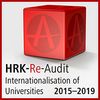27.07.2022
Article in "Wirtschaftsdienst" - German companies in Africa
Publication after collaboration of the authors Prof. Dr. Philipp von Carlowitz (ESB Business School), Prof. Dr. Dirk Dohse and Sophia Fehrenbacher (both Kiel Institute for the World Economy).
As part of the "Cluster Wirtschaftswissenschaftliche Afrika-Forschung", which is funded by the German Federal Ministries of Economy & Climate and Finance, an article entitled "Developing Potential and Sharing Knowledge: How German Companies Can Gain a Foothold in Africa" was published in the journal "Wirtschaftsdienst" last week. The publication is the result of collaboration between Prof. Dr. Philipp von Carlowitz (ESB Business School), Prof. Dr. Dirk Dohse and Sophia Fehrenbacher (both Kiel Institute for the World Economy). It analyzes opportunities and barriers to investment for companies in Africa, digital transformation and innovation processes using Nigeria as an example. Some of the core findings are:
- Innovation processes of firms in Africa differ from those in industrialized countries. Close cooperation with other domestic companies is a key driver of innovation. In contrast, cooperation with research institutions or foreign companies is currently of secondary importance. In principle, however, African companies have a lot to gain from cooperation with Western companies through various spillover effects.
- Digital technologies are seen as key levers for raising potential and overcoming barriers to investment and innovation in Africa. This can increase the chances for a successful engagement of German companies in Africa. For example, a commitment by German companies in Africa should be long-term and they should be prepared to develop potential and share their knowledge with African companies.
- Uncertainties and a lack of information about African markets are cited as reasons for low levels of German direct investment. Here, many companies need to focus more on the future strategic importance of these growth markets and re-evaluate and re-orient their long-term internationalization strategy.
You can find the entire article here!


![[Translate to English:]](/fileadmin/_processed_/2/a/csm_Header_03_e6ef15832d.jpg)



